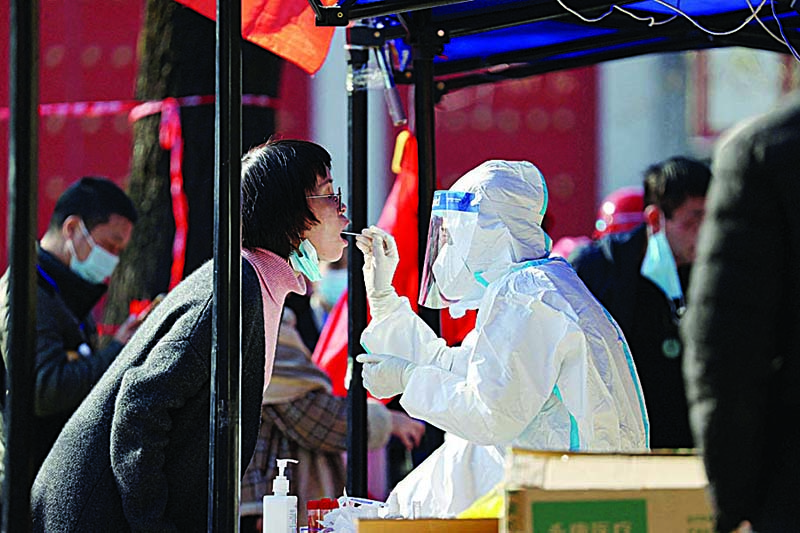 XIAN, SHAANXI, China: A medical worker takes a sample from a resident to be tested for the COVID-19 coronavirus in Xi’an, in China’s northern Shaanxi province yesterday, after the detection of more than 40 new cases raised concerns of wider transmission ahead of a busy travel season. —AFP
XIAN, SHAANXI, China: A medical worker takes a sample from a resident to be tested for the COVID-19 coronavirus in Xi’an, in China’s northern Shaanxi province yesterday, after the detection of more than 40 new cases raised concerns of wider transmission ahead of a busy travel season. —AFPBEIJING: The Chinese city of Xi’an began testing millions of residents for the coronavirus yesterday after the detection of more than 40 new cases raised concerns of wider transmission ahead of a busy travel season. China, where the virus was first detected, has slowed new cases to a trickle since the middle of last year through border restrictions, targeted lockdowns and lengthy quarantines as it pursues a zero-COVID strategy.
But the world’s second-largest economy is now fighting local outbreaks in several cities, including key industrial hubs in the east and south. Authorities are keen to extinguish the flare-ups ahead of a crucial period that will see the capital Beijing host the Winter Olympics in February as well as a surge in cross-country travel during the Lunar New Year.
Xi’an-a historic northwestern city of around 13 million people-recorded 42 new cases yesterday, bringing the total number detected since December 9 to 91, according to figures from the provincial health commission. The city has also shut schools and large indoor recreation venues while encouraging residents to avoid going out and congregating in large groups, according to local government notices.
The museum housing the world-famous Terracotta Army-the 2,000-year-old mausoleum of China’s first emperor-said in an online statement that it had closed from Sunday “according to the needs of epidemic prevention work”, without giving a reopening date. COVID-19 is not the only scourge to hit Xi’an in recent weeks, with the city also logging several cases of potentially deadly haemorrhagic fever since the beginning of winter. Local authorities have urged calm about the rodent-borne disease, saying it is common across northern China and easily preventable through vaccination. —AFP









